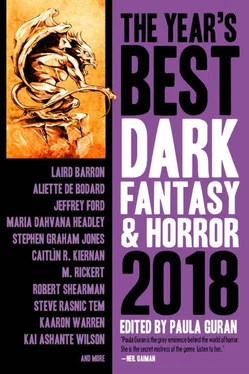It finds a man who looks like its maker, and wraps around him, hidden in the lining of his coat, and when it discovers the man is no poet but only an invention of a poet, it presses the man down in the darkness of the drive and drinks his dreams.
Night inhabits a house, hidden in closets and beneath beds, and when the world is in shadow, it wanders the streets, seeking its god and his pen. It finds only the young wife, an invention herself, her skin pale and her hair black, her eyes violet. It binds itself to her body.
Annabel , Night hisses, or Lenore , or Virginia . It calls her every version of the names its creator has called his loves. It hides in her hair, plaited among flowers, and in her skin it anchors, a ship full of the lost souls of Thule. It makes its way into the world with Annabel, this creature, and to a city it finds familiar. It feeds on poets, amputating sentences, lyrics, love letters, but none of them are the right ones.
And then.
The Dreamer’s Journey
The poet writes in a frenzy, in an attic room in a city by the sea. There is sun, but he denies it. The world he belongs in is a world of rain, and the only climate is one of mist and dim. He writes a ship in a harbor, and on the ship a crew of sleepers. He writes a sail made of paper, and written on it is a poem about a kingdom burning. He writes himself, swimming in water made of something that can catch fire. He closes his eyes, dreaming the dream within the dream, and in it, he dives, the water filled with nothing but hunger, the sea below him ice and skeletons. He swims to shore in evening dress, shivering, shuddering, chasing the raven that fled his companion, chilling and killing the poet by the sea, dreaming and drafting a story of a stowaway captured.
He thinks of years spent following love, and of years spent losing it. Shaking at the desk in the dark now, the dreamer watches snow falling into the world he’s made. He spins a net of words and weaves sentences into rope.
Now he is in a hotel in Providence. His mind has moved him from city to city, along the rails and to this place. He has built and sold imaginary kingdoms and now, at the end of his life, he is responsible for monsters.
All this he writes over the head of the innkeeper, a woman living between worlds, her hair pale and about her neck a gemstone mined in a pretender’s place.
Poe is broken with drink and disaster, and something has bitten him in a street, a rangy dog with blood in its eyes and foam at its jaw. He doesn’t mind it. Things have bitten him all his life. He is a man born of dreams, and in dreams he remains, the child of actors, and all his life a play.
He wanders as he writes, pacing the room in Providence, here to no end but his own. The world of his dream and the world of his story are entwined now, and he walks real streets in imaginary places.
Somewhere out there is his companion, invented as a cure for pain. Somewhere is a beast made of morphia, a soothing icy hand on the forehead, something that will cure his pangs and fevers, something that will walk with him when he walks toward the land of the dead. Though it is a monster, it is his monster.
He writes it into this hotel, and places it in hiding in a woman he’s made of words. He writes himself into the sea, and feels it rising in his rooms, the water green and salty, the cuffs of his trousers drenched, his belt sopping, his shirt transparent and floating, his white ascot tightly tied about his throat.
Edgar Allan Poe swims in a sea of ink.
The Lady’s Tale, Second Part
Sometime in that night at the inn, I saw movement outside my window.
Phosphorescence, I thought at first, a ripple cresting a hidden shoal, but then it was more, a man in a cream-colored waistcoat and black string tie, emerging from the water, drenched and heaving. He crawled up, and I sat up in bed, drawing my wrapper more tightly about myself. A long black mustache and long black hair, his eyes desolate and his face forlorn. I dared not move. He looked rather like my former husband, and he shared with that man a visible despair. I wondered how long it would be before he was dead, if he were not already.
He stood beneath my window looking up at me, and his gaze did the opposite of burn. I did not open the window, but I found my fingers stretching toward the sash. Only the chains kept me from reaching it.
Wake, he whispered, but I did not know how.
I must have fallen into sleep, for an insistent bell woke me at dawn, and the innkeeper entered with a tray. There were no burning eyes in my memory, nor was my body tender. I did not feel pains in my body that might suggest a night walk, nor did my mouth taste of metal. Within my body though, I felt the telltale motions of the stowaway, swimming in a tight circle.
“What is this?” asked the innkeeper, looking at my chains.
I looked at her with as much dignity as I could muster, and I said, “Might you release me? The key is on the pillow, just there.”
She placed the tray on the bed and fetched the key.
“How am I to know if freedom suits you?” she asked.
“My agonies occur only at night,” I told her, for the stowaway took no notice of the innkeeper. It did not wish for women, nor did it care for daylight. It slept within me when the sun was high.
“Will you continue your tale?” the innkeeper asked, unlocking my chains with less caution than I might have imagined she’d use. She poured a cup of coffee and delivered it into my shaking hands.
I indicated that I would, and the innkeeper withdrew long enough that I might tidy myself. Back then, to that sitting room downstairs, with its view of the silvery bay, a pot of coffee rather than tea, to increase my strength for the day ahead.
The innkeeper sat opposite me. “The night six months past,” she said, prompting me back to my tale.
I ate a spoonful of porridge and sipped my coffee, feeling the heat in my body, a healthy heat, not that of the stowaway. For a moment I felt hopeful.
“Though the stowaway’s presence prohibited guests to my house, I was at liberty to leave it. The stowaway seemed to see me as a gentle pet, a cat who might play about in the garden while its owner remained in the house. Thus were my days spent, with concerts and the usual occupations of a lady. It was not, despite the trouble in my house, a terrible life.
On the evening in question, I sat at the piano, picking out a song, and as I did, I noticed a stirring in the wall. I withdrew my fingers from the keys, fearing a mouse or moths, never imagining—”
I looked around the sitting room, fearing eyes and ears in the walls, but there was nothing visible here.
“A man emerged from the wallpaper, hair silken as fur, eyes like seaglass. Out of the floral pattern he came, his suit patterned with falling leaves, and I knew I could not trust a man who arrived that way, but there was no help for it. He stepped into the room, hung his coat on the tree, and walked across the carpet making no sound at all. I looked down at his feet, and they did not touch the ground.
He nodded at me, implying that I continue to play. I did, though my playing was nothing to be proud of, neglected in my duties as the keeper of a dead man’s house. When, at last, I stopped, the man looked steadily at me.
“Who are you?” I whispered. “Have you come to deliver me from my stowaway?”
He looked at me, and said “I am a dreamer come to save you from darkness, Annabel MacFarlane, if you will be saved.”
Why should I not allow the haunting, I thought. Why should I not give myself over to a dream? I had been alone for a very long time, and it seemed no harm to invite air into the house.
The dream gave me a ring, bent of a length of gold wire. He ran icy fingers over my skin—”
Читать дальше












